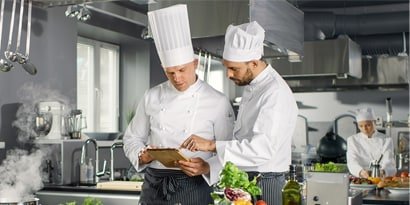Within the culinary prowess realm, every dining establishment’s nucleus resides in its kitchen. Behind closed doors, an intricate orchestration of ingredients, methodologies, and skills coalesce to craft unforgettable dining moments. Yet amid the whirlwind of creativity, there exists an often underestimated ally in the quest for culinary excellence: efficient kitchen equipment. Ranging from the modest stove to the sophisticated food processors, each component assumes a pivotal role in molding the triumph of a restaurant. This article explores further the importance of efficient kitchen equipment and its profound influence on the culinary domain.
Enhanced Productivity and Streamlined Workflow
Time management is critical in a bustling restaurant kitchen. Efficiently managed restaurant equipment is the backbone of a successful culinary operation, facilitating seamless workflows and elevating patrons’ dining experience.
A meticulously organized kitchen layout combined with cutting-edge appliances substantially reduces preparation time, expedites cooking procedures, and ensures prompt service to patrons. Whether it’s a high-speed oven for swift baking or a commercial blender for velvety sauces, each tool seamlessly integrates into the workflow, amplifying overall productivity and enabling the kitchen team to meet the demands of a busy service effortlessly.
Consistency in Excellence
Consistency serves as the bedrock of culinary mastery. Discrepant cooking outcomes not only tarnish a restaurant’s standing but also result in dissatisfied clientele. Trustworthy kitchen equipment upholds precise temperatures, cooking durations, and portion sizes, guaranteeing that every dish faithfully embodies the chef’s vision.
Whether it’s a flawlessly seared steak or impeccably baked pastries, maintaining unwavering quality is indispensable, with efficient equipment serving as the linchpin. By eradicating variables and ensuring uniformity in every culinary creation, restaurants forge a bond of trust with their clientele, carving out a reputation for unwavering excellence.
Cost Efficiency and Environmental Responsibility
In the fiercely competitive restaurant industry, financial prudence is paramount. Efficient kitchen equipment not only curtails operational expenses but also champions sustainability. Appliances designed for energy efficiency consume less power, resulting in lower utility expenses and a reduced environmental impact.
Moreover, robust equipment necessitates fewer repairs and replacements, conserving both finances and resources in the long haul. By investing in energy-conserving and eco-conscious kitchen solutions, restaurants not only bolster their financial standing but also bolster their image as socially responsible entities.
Adherence to Safety and Hygiene Standards
Upholding impeccable standards of safety and hygiene is non-negotiable in any professional kitchen. Efficient equipment not only fortifies the safety of kitchen operations but also facilitates compliance with health regulations.
From temperature-regulated storage units to self-sanitizing ovens, modern kitchen appliances are meticulously designed with safety and sanitation at the forefront. By mitigating the risk of cross-contamination and foodborne illnesses, efficient equipment safeguards both the restaurant’s reputation and the well-being of its patrons.
Adaptability to Evolving Culinary Trends
The culinary landscape undergoes perpetual evolution, with novel trends and techniques perpetually emerging. Restaurants must remain agile, embracing innovation and adjusting to shifting consumer preferences. Efficient kitchen equipment empowers chefs to explore diverse culinary styles and ingredients, from sous vide cooking to plant-based alternatives.
By furnishing the requisite tools for experimentation and creativity, efficient equipment enables restaurants to remain pertinent and captivating amidst a dynamic market. This adaptability not only appeals to adventurous diners but also ensures that the menu remains dynamic and engaging, fostering customer loyalty and recurrent patronage.
Staff Contentment and Retention
The strength of a restaurant hinges on its personnel, and employee satisfaction constitutes a linchpin of organizational prosperity. Obsolete or defective equipment not only impedes productivity but also fosters disillusionment among staff members, precipitating dissatisfaction and high turnover rates.
Conversely, efficient kitchen equipment engenders a positive work milieu, empowering chefs and kitchen staff to execute their responsibilities with aplomb. By investing in the welfare and efficacy of their employees, restaurants cultivate a culture of loyalty and retention.
Elevated Customer Experience and Fidelity
Ultimately, a restaurant’s triumph hinges upon the satisfaction and loyalty of its clientele. Efficient kitchen equipment plays a pivotal role in sculpting the dining experience, from the promptness and precision of service to the caliber and presentation of dishes.
By consistently delivering excellent fare in a timely fashion, restaurants foster customer loyalty and engender positive word-of-mouth endorsements. Furthermore, the conspicuous presence of contemporary and well-maintained equipment augments the ambiance and professionalism of the establishment, leaving an indelible imprint on patrons.
Conclusion
Efficient kitchen equipment transcends its role as a mere tool to become a foundational pillar of success within the restaurant industry. From bolstering productivity and ensuring consistency to championing safety and sustainability, contemporary appliances assume a multifaceted role in sculpting the culinary domain. Through strategic investment in efficient equipment, restaurants can optimize their operational efficiencies, gratify their patrons, and solidify their status as preferred culinary destinations.
